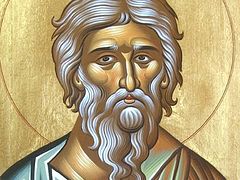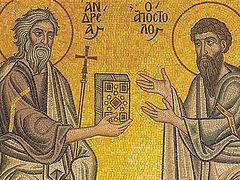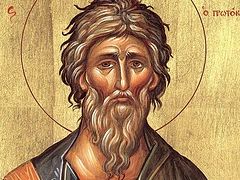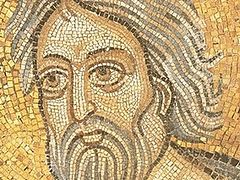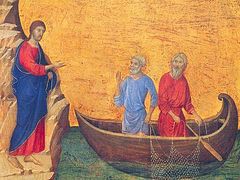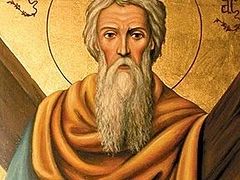Quench not the spirit.
1 Thessalonians 5:19
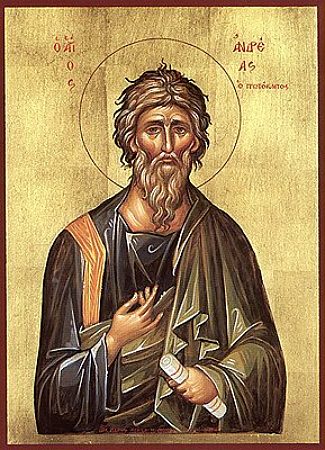 Today we celebrate the memory of the Holy Apostle Andrew the First-Called. This Apostle means very much to the Russian Church. There is tradition that says that during the course of his apostolic journeys, he reached the hills of Kiev and erected a cross there, blessed the people, and pronounced a prophecy: “On these hills will shine forth the grace of God, and a great city will be created here, and the Lord will raise up many churches in it.” Thus in Rus’,[1] even before a Russian state was founded, the beginning of an Apostolic Church was placed, for in its foundation was placed the good tidings of one of the apostles. The holy Apostle Andrew’s prophecy about Kiev was fulfilled under the reign of Equal-to-the-Apostles Prince Vladimir. During his days, the fire of the grace of the Holy Spirit, which descended upon the Apostle Andrew on day of Pentecost, shone forth in Kiev, and then over all of Rus’. The Church that then arose in Rus’ became a member of the Ecumenical Church, in which the grace of the Holy Spirit, enlightening and illumining, will abide until the end of time.
Today we celebrate the memory of the Holy Apostle Andrew the First-Called. This Apostle means very much to the Russian Church. There is tradition that says that during the course of his apostolic journeys, he reached the hills of Kiev and erected a cross there, blessed the people, and pronounced a prophecy: “On these hills will shine forth the grace of God, and a great city will be created here, and the Lord will raise up many churches in it.” Thus in Rus’,[1] even before a Russian state was founded, the beginning of an Apostolic Church was placed, for in its foundation was placed the good tidings of one of the apostles. The holy Apostle Andrew’s prophecy about Kiev was fulfilled under the reign of Equal-to-the-Apostles Prince Vladimir. During his days, the fire of the grace of the Holy Spirit, which descended upon the Apostle Andrew on day of Pentecost, shone forth in Kiev, and then over all of Rus’. The Church that then arose in Rus’ became a member of the Ecumenical Church, in which the grace of the Holy Spirit, enlightening and illumining, will abide until the end of time.
Each of us is a participant in that grace. At the beginning of our lives we received it in the sacraments of Baptism, Chrismation, and Communion. And thanks be to God, many of us have preserved this grace, and with its help have significantly progressed in labors of piety and virtue. What a pity, however, that this cannot be said for all of us! The fire of grace that was lit in each of our souls is barely noticeable in many of us. Neither the light nor the warmth are tangible in in many of our souls, as if they had not even come into contact with the fire of grace; as if they are not Christians but infidels, or pagans.
What causes this situation so worthy of lamentation? Why doesn’t the fire of grace given to us manifest its saving power, why doesn’t it burn in us, or just barely burn? It is for the same reason that material fire in a furnace or a lamp does not burn. If you want this fire to not go out, do not spare the firewood or oil; stoke the furnace and pour oil into the lamp. Do the same when it comes to the fire of grace. Do not quench the spirit of grace; support its burning through your personal efforts, through your personal zeal for progress in the spiritual life. We beseech you also, said the Apostle Paul to the Corinthians (6:1), that ye receive not the grace of God in vain; that is, do not think that the grace of God given to you consists only in the remission of sins and obligates you to do nothing more. No, the Lord demands also labors of zeal and correction of our lives. For, if having received remission of sins and having made peace with God we live as we did before, we can also begin to be at enmity as before, and thus we have received grace in vain. Grace does not save us if we live an impure and dishonorable life; to the contrary, our liability for our sins only increases if we just return to our former iniquity after receiving such a great gift.
Thus, it is demanded of us that having received grace we might with its help strive to live worthy of grace. Grace is the light of our mind, for it is a fire. Thus, let us strive to exercise ourselves in the contemplation of God, in the study of the true faith, in zeal for guarding ourselves from error and false sophistry, so that not only will we be free of these things, but we might be accountable to others in our hope, and make wise the unbelievers and false thinkers. If grace is a fire that warms the soul with its warmth, then let us strive to assimilate the teachings of the faith not only with our minds, but also with our hearts, and be guided by them in life. It is good for those who have received these teachings in their hearts and delight in them. The heart warmed by love and the Lord’s commandments will make it easier to fulfill them, for love has just such power, that the one who loves never feels burdened by any labors and asceticism done to please the Beloved.
Let us give thanks, brethren, to the Lord, Who has placed the fire of grace in our souls, and let us stoke it with our zeal to correct our lives and progress in a holy and God-pleasing life.
From: Teachings and sayings in Kostroma in 1897 by Bishop Vissarion (Moscow: University printers, 1899), 281–283 [Russian].

